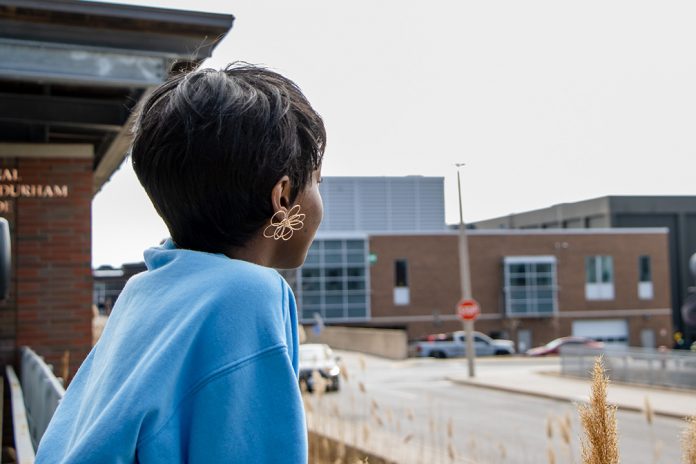The urgent need for mental health care in Canada has become increasingly recognized over the past two decades. However, for Black Canadians, accessing adequate mental health services remains a significant issue. A troubling statistic from the Mental Health Commission of Canada in 2021 revealed that nearly 35 per cent of Black Canadians experience psychological distress, yet only 1.2 per cent seek support. This gap between need and access is alarmingly wide, prompting a new initiative at Durham College.
Bridging the Gap: Developing Culturally Responsive Mental Health Care with and for Black Communities is a research project made possible by a $360,000 federal grant provided to the college’s Social Impact Hub. The project aims to explore the barriers Black Canadians face in accessing mental health care and develop solutions that will make support more accessible and tailored to the community’s needs.
“We’re not just doing research; we’re listening to the Black community, ensuring their voices shape the mental health resources being created,” said Dr. Crystal Garvey, the lead researcher at Durham College’s Social Impact Hub. “Our goal is to build a system that truly addresses the unique mental health challenges faced by Black Canadians, from cultural sensitivities to deep-rooted historical mistrust.”
The project, which recently received Research Ethics Board (REB) approval, is in its initial data collection phase. The research team is gathering insights from Black Canadians who have engaged with mental health services, as well as from clinicians providing care. Early findings are expected to be available by late summer or early fall 2025.

For too long, Black Canadians have faced significant obstacles when seeking mental health care. From misdiagnoses to a lack of cultural understanding in mainstream health services, these barriers have contributed to the community’s reluctance to seek help.
“The fear of negative outcomes, like being misunderstood or misdiagnosed, has led many Black Canadians to avoid getting the care they need,” said Dr. Garvey. “This project is about breaking that cycle, building trust and providing the community with early intervention and education before a crisis arises.”
Jason Vassell, one of the lead researchers on the project, emphasized the importance of including health-care providers’ perspectives in the study.
“By incorporating clinicians into our study, we ensure that the lived experiences of Black patients are not only captured but also supported by clinical insights,” he said. “This approach prevents the research from being purely anecdotal, reinforcing these realities with a professional perspective that transcends personal or emotional narratives.”
Vassell also noted that all findings currently in the research process remain confidential.
This new initiative brings together community partners, including the Health Research Council for People of African Descent, Black Health Alliance and Ontario Shores Centre for Mental Health Sciences, to co-create self-advocacy, self-care and system navigation resources specifically designed for Black patients. These efforts are intended to ensure Black Canadians feel safe, understood and supported when they seek mental health care, particularly in crisis situations where their needs are often ignored.
But what does this project mean for students, especially those from racialized communities?
Katherine Chambers, a racialized therapist at Trent University Durham, understands firsthand the importance of culturally responsive care.
“Black and other racialized students often face layers of systemic oppression and racial trauma, both on and off campus,” she said. “When they don’t see mental health professionals who look like them or understand their experiences, it can prevent them from seeking help.”
Chambers explained that many racialized students often navigate the belief that mental health challenges are something to “pray away” or “push through” rather than address with therapy.
“There’s this pressure to be resilient in the face of adversity, which can discourage students from reaching out for support,” she said. “Mental health services need to show that it’s OK to ask for help.”
For some Black students, the stigma surrounding mental health has kept them from even considering support services.
J.R., a second-year Durham College student, said they have never accessed on-campus mental health resources due to fear of judgment from their friends and family.
“In my family, needing any mental health support is seen as a weakness,” they said. “I’ve struggled with depression and anxiety, but I’ve always been told to just deal with it on my own. Seeing a therapist who understands Black experiences would make a huge difference.”
The project, which will run until May 2027, is expected to have an impact beyond the research phase. The creation of culturally responsive mental health training programs for health-care professionals will help them better serve Black Canadians, ensuring that Black patients feel heard, understood and supported during their care.
Over the next year and a half, the research team will focus on data collection through targeted marketing efforts and collaborations with community partners. This initiative represents a step forward in addressing long-standing gaps in Canada’s mental health system. With ongoing research and collaboration, the hope is that Bridging the Gap will create lasting improvements in the accessibility and quality of mental health care for Black Canadians.




